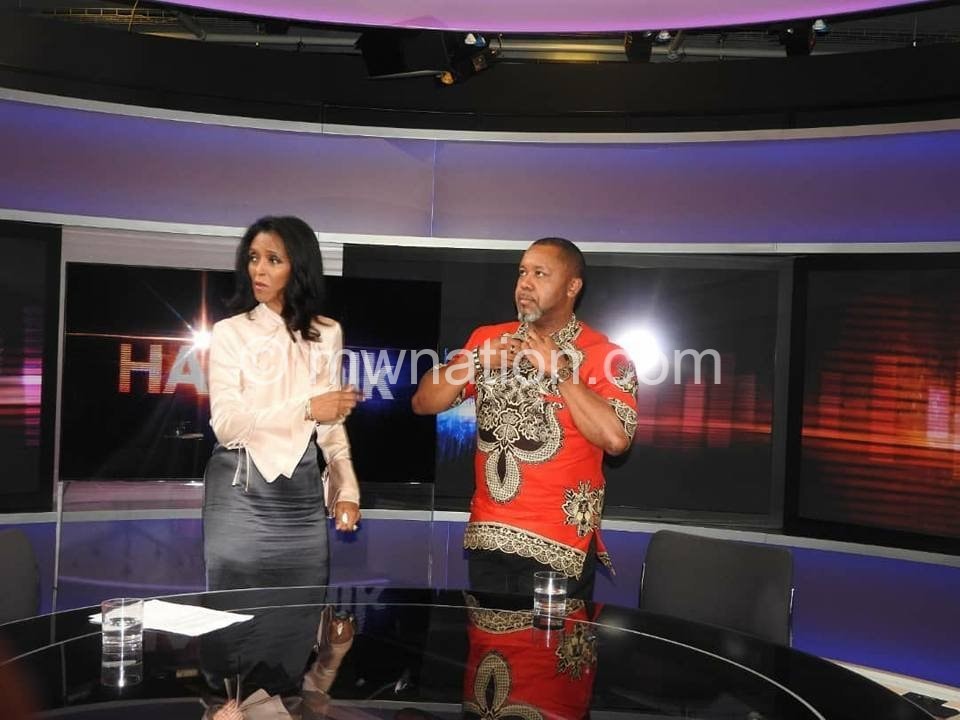SKC shields JB on BBC
Vice-President Saulos Chilima, who cited rampant corruption as the reason he quit the governing Democratic Progressive Party (DPP), on Thursday reserved his comment on suggestions that former president Joyce Banda’s anti-corruption record was poor.
Chilima, who featured as a guest on Thursday in one of BBC’s highly-rated programmes, HARDtalk, said it would be unfair to suggest that Banda’s corruption record was poor.

The Vice-President, facing one of the programme’s renowned hosts, Sudanese-British television and radio journalist Zeinab Badawi, said the correct thing was to say that under Banda’s regime, Malawians uncovered “serious or massive plunder” of public funds.
But Badawi quizzed Chilima further, arguing donors withdrew the country’s 40 percent of budgetary support owing to Cashgate that took place under her watch and asked the Chilima how he came around after having a meeting with her in September and claimed that they have a shared vision.
The host also pressed Chilima on how he could not, in the same way, work with President Peter Mutharika who was inviting everyone to work with him to fight corruption, but Chilima was instead applauding a former president with a tainted corruption record.
“Was her record good on tackling corruption?” Badawi asked.
And Chilima responded: “Well, I can reserve that because…”
The host insisted: “You can reserve but I can tell you this: You know what happened; the donors pulled out, tens of millions of dollars went missing…even if she is not culpable…but you applaud her that you have got a shared vision with her?”
But Chilima insisted meeting a former president was not an issue, so too was sharing a common vision. He added Banda is not a convict or facing any corruption charges.
Chilima’s backing of Banda has led to some analysts believing that the two could be negotiating a partnership.
Chancellor College political analyst Ernest Thindwa, in an interview on Friday, said there is no way Chilima was going to say anything ill against Banda because there were some indications the two may work together.
He said everyone, including Chilima, must have knowledge that the former president did a bad job of fighting corruption, arguing Cashgate was a clear indicator that something was amiss.
“It is not surprising that the Vice-President may not want to say anything concerning the former president or may not give a clear answer. They appear, from the meeting they had, they want to work together in an electoral alliance or something.
“In Malawi politics, it does not matter whether people have a shared vision or not, whether they have same principles or not, it is all about political convenience, about winning the votes, and nothing else. So, the Vice-President may not have anything that had potential to strain the relationship,” Thindwa said.
Another political commentator, Henry Chingaipe said, in an interview on Friday, that considerations of political correctness and narrow interests may have compelled Chilima not to mention Banda involvement in corruption.
He said he had no idea what Chilima and Banda discussed during their meeting, but it is clear they have a common political enemy, and a shared objective.
“If an alliance between them and their political outfits is in the offing, that may have compelled the Vice-President to avoid personally blaming Banda for corruption,” Chingaipe said.
The political scientist, commenting on how Chilima handled the interview, said he was a little casual or not well-prepared, arguing it was not clear whether he had a clear and specific message he wanted to communicate, but one got the impression that he went in just to answer the questions and did not fully anticipate the kind of questions that were in the offing.
On the host’s question where she pressed Chilima on his decision to remain in an administration he is accusing of corruption, Chingaipe said was an obvious question from any interviewer because one sees a dilemma for the Vice-President and the inability to balance pecuniary interests, legality and personal integrity and political ambition.
Chilima justified his continued drawing of a salary that he was still going to his office, giving counsel to various citizens that seek it, among other roles.
Asked whether the BBC interview helped or hurt Chilima or whether he grabbed or missed the opportunity to promote his United Transformation Movement (UTM), political communications expert Wisdom Chimgwede said the Vice-President grabbed the opportunity well in the context of the audience he addressed.
“The strength he displayed is the consistency. He, basically, replayed the same script he has used throughout his rallies, press conferences and such other forums since June. But whether that helps his political agenda back home in Malawi, I doubt. The audience he addressed has no direct impact in influencing the much-needed vote.
“In any event, speaking to the international community has really never helped earn anyone the vote in Africa. Examples are plenty, including Zimbabwe and Zambia, nearby,” he said.
Jimmy Kainja, a lecturer at Chancellor College’s Department of Media, Communication and Cultural Studies, said the BBC HARDtalk host and Chilima come from two different backgrounds, with different cultures.
He said people in the UK would expect someone who has disagreed with an administration to quit. He said Badawi displayed accountability journalism by making Chilima account for promises made.
Chilima left for the United Kingdom last Sunday on holiday and is expected back tomorrow. Among other activities, he spoke at the Royal Institute of International Affairs at Chathan House in London.
He is set to challenge Mutharika for presidency on a UTM ticket. However, the movement is struggling to register as a political party after the Registrar of Political Parties rejected their application. The matter is in court.





